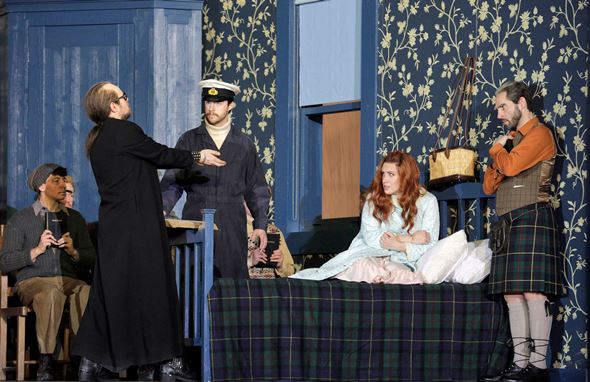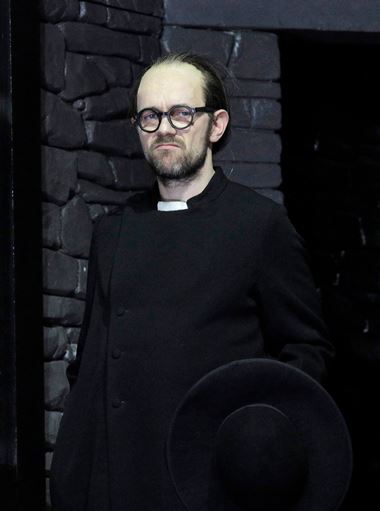Handel’s ‘Ariodante’ at Lyric Opera: Another star felled by illness; enter heroine (as hero)

Polinesso (Iestyn Davies) mimes exorcism of the evil in the heart of Ginevra (Brenda Rae) as her father, the King (Kyle Ketelsen, right), looks on. (Production photos by Cory Weaver)
Review: “Ariodante” by G.F. Handel, at Lyric Opera of Chicago through March 17 at the Lyric Opera House. ★★★★
By Lawrence B. Johnson
Spring – and the warmer, more healthful weather it augurs – can’t come too soon for Lyric Opera of Chicago. As of this writing, two title-role singers were indisposed. At least one of them, soprano Albina Shagimuratova, made it through opening night as Violetta in Verdi’s “La traviata.” But the second star to withdraw, mezzo-soprano Alice Coote, wasn’t even up for the March 2 opening of Handel’s “Ariodante.”
The two operas have been alternating on the Lyric stage with titular stand-ins – both of them products of Lyric’s Ryan Center for the advanced training of young professional singers. Emily Birsan has sung three performances, all but the first night, as Violetta. And Julie Miller was pressed into service on opening night as Ariodante, a huge “trouser” role aglitter with coloratura fireworks but also touched by music of profound reflection. Miller proved to be more and more impressive as the night wore on.

Julie Miller stepped into the demanding trouser role of Ariodante and grew more impressive as the evening wore on.
And it is a long night. “Ariodante” runs just under four hours, though it is typical of Handel as a staggering bounty of great music that seems to fly by. For the title character, it’s a veritable vocal marathon.
The story centers on the impending marriage of the young nobleman Ariodante and Ginevra, daughter of the King. But the envious and lustful Polinesso contrives to compromise Ginevra, devising an assignation with her lady-in-waiting dressed as the princess. When Polinesso brazenly throws his faux triumph in the face of Ariodante, the dismayed fellow tries to kill himself, but cruel fate won’t grant him even that much grace. All ends well, though, when Polinesso, mortally wounded by Ariodante’s brother, confesses his transgression.
Lyric’s production, a joint venture with the Festival d’Aix-en-Provence, Dutch National Opera in Amsterdam and Canadian Opera in Toronto under the direction of Richard Jones, updates and relocates the action to vaguely modern Scotland. But more than that, the nefarious Polinesso is transformed into a Calvinist preacher, a vile hypocrite who spends the Overture haranguing to his flock on the inherent wickedness of women: We know the theme of his mimed sermon because an insistently damning text is projected in the surtitle space.
Miller, tall and persuasive as a young man, came to her formidable assignment well prepared. It was hardly surprising that she sounded tentative in the early going, though the warmth and accuracy of her singing – and certainly her all-important vocal agility – were above question. A Handel opera is a parade of da capo arias, in which the initial expression of the text is vocally elaborated in a second pass embroidered with florid ornamentation. Miller was quite convincing in her sense of the style, and by the time she got to Ariodante’s heart-broken lament upon learning of Ginevra’s betrayal, her singing was measured, precise, authoritative and beautiful.

Ginevra (Brenda Rae) is distraught and confused by accusations that she has violated her betrothal to Ariodante.
As the horribly wronged Ginevra, soprano Brenda Rae acted with an immersion worthy of her stellar vocal display. Ginevra goes from giddy girl on the verge of marriage to utterly distraught and madly confused by the charges brought against her – and by the instant categorical rejection she meets even from her father. In Ginevra’s reeling response to her wretched predicament, Rae was the complete singing actress.
Countertenor Iestyn Davies’ sang brightly as the black-hatted bad guy, even if his posturing bordered on caricature. Nothing much is gained by this overlay of Polinesso as corrupt preacher, except perhaps a gratuitous poke at the clergy in general. But then neither does it get in the way. What does become a bother are some crude sexual innuendoes. You’re trying to listen to the singing on one side of the stage while the eye is induced back to an adjacent room where Polinesso and his accomplice, Ginevra’s attendant, are rather specifically abed. And you’re thinking: surely not.
Polinesso’s hypocrisy peaks in another mimed bit, when the parishioners present themselves as witnesses, Bibles in hand, as the high-minded preacher affects to purge poor Ginevra of the devil. It’s a scene straight out of Arthur Miller’s play “The Crucible.” Meanwhile, Ginevra’s betrothed Ariodante, his spirit crushed, sings of his misery and incredulity in the next room.

In Handel’s original version of “Ariodante,” Polinesso (Iestyn Davies) is a nobleman, but in this production he’s a corrupt preacher.
Soprano Heidi Stober offered a lovely vocal portrait of the attendant, Dalinda, who like the princess gets thrown for a loop as Polinesso’s dastardly plan becomes clear. Bass-baritone Kyle Ketelsen was a virile, vocally resplendent King, and tenor Eric Ferring, a first-year member of the Ryan Center, repeatedly threatened to steal the show with his clear, fluent, always expressive singing as Ariodante’s brother Lurcanio.
Handel provided music for two substantial ballet episodes, which here becomes accompaniment to puppetry: charming in the first instance as an enactment of the couple’s bountiful production of offspring and brutal in the second as slashing mockery of Ginevra as a shameless strumpet.
The presence of conductor Harry Bicket in the pit means this Baroque endeavor is in very good hands. Bicket managed to elicit crisp, incisive playing from the Lyric Opera Orchestra while at the same time providing fluid support for the singers. The result was Handel opera served fresh, buoyant and vital.
Related Link:
- Performance location, dates and times: Details at TheatreInChicago.com

